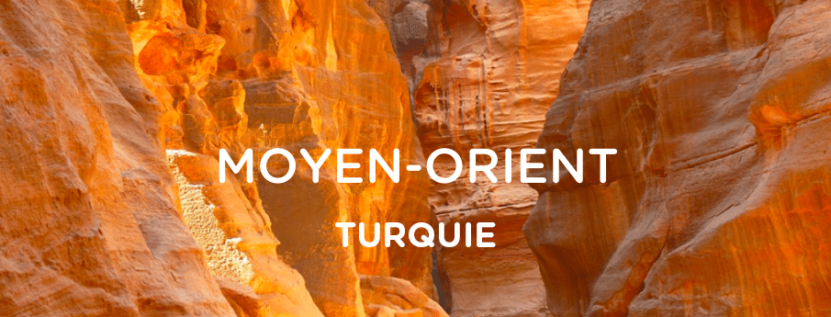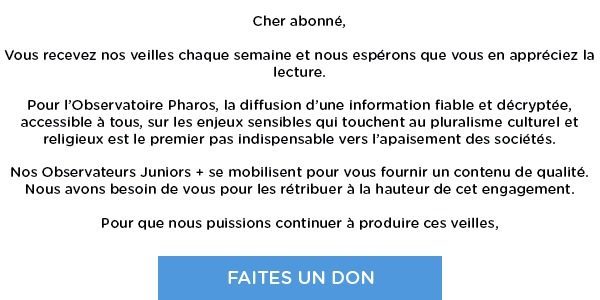|
| |
Cette semaine, nous revenons sur les décisions prises par le Comité des ministres du Conseil de l’Europe relatif à la politique du gouvernement turc envers la communauté alévie. Le Conseil de l’Europe a appelé les autorités turques à garantir la neutralité et l’impartialité de l’État à l’égard des différentes religions, confessions et croyances, dans le respect des principes de pluralisme et d’objectivité. Par ailleurs, le président turc Recep Tayyip Erdoğan a rappelé que la Turquie ne reconnaît et ne reconnaîtra pas les décisions prises par la Cour européenne des droits de l’Homme dans les affaires relatives à la détention d’Osman Kavala, philanthrope ciblé en raison de son soutien aux soulèvements de Gezi en 2013, et de Selahattin Demirtas, dirigeant du Parti démocratique des peuples (HDP, pro-kurde, gauche), accusé d’appartenance à une organisation terroriste et de porter atteinte à l’intégrité nationale. De plus, nous mentionnons le témoignage d’Asli Erdoğan (qui n’a aucun lien de parenté avec le président Recep Tayyip Erdoğan) dans les colonnes de Télérama concernant les nouvelles poursuites dont elle fait l’objet. Exilée en Allemagne depuis 2016, elle déplore notamment que ses engagements pro-kurdes soient la cause de cet acharnement judiciaire du gouvernement AKP à son encontre. Enfin, sur le volet diplomatique, nous évoquons les déclarations simultanées des ministres arménien et turc des Affaires étrangères relatives à un « dégel » des liens entre les deux pays, avec la nomination « d’émissaires spéciaux » chargés de discuter de la normalisation des relations historiquement hostiles entre les deux voisins.
This week we look back at the decisions taken by the Committee of Ministers of the Council of Europe regarding the Turkish government's policy towards the Alevi community. The Council of Europe has called on the Turkish authorities to ensure the neutrality and impartiality of the State towards different religions, confessions and beliefs, in compliance with the principles of pluralism and objectivity. Furthermore, Turkish President Recep Tayyip Erdoğan reiterated that Turkey does not and will not recognize the decisions made by the European Court of Human Rights in the cases of the detention of Osman Kavala, a philanthropist targeted because of his support for the Gezi uprisings in 2013, and Selahattin Demirtas, leader of the left-wing pro-Kurdish Peoples' Democratic Party (HDP), who is accused of belonging to a terrorist organization and undermining the national integrity. In addition, we mention the testimony of Asli Erdoğan (not related to the President Recep Tayyip Erdoğan) in the columns of Télérama regarding the new prosecutions against her. Exiled in Germany since 2016, she deplores that her pro-Kurdish commitments are the cause of this judicial persecution against her by the AKP government. Finally, on the diplomatic front, we mention the simultaneous statements of the Armenian and Turkish foreign ministers regarding a "thawing" of ties between the two countries, with the appointment of "special emissaries" to discuss the normalization of historically hostile relations between the two neighbours.
|
|
|
|
| |
L'info phare - Source institutionnelle
|
|
|
|
| |
|
Le Comité des ministres du Conseil de l’Europe exhorte la Turquie à respecter la neutralité religieuse envers la communauté alévie
Du 30 novembre au 2 décembre, le Comité des ministres du Conseil de l’Europe s’est réuni dans le cadre de plusieurs requêtes initiées par des fondations alévies de Turquie contre le gouvernement turc. Les ministres ont ainsi exhorté les autorités turques à respecter la neutralité religieuse en mettant notamment fin à la discrimination relative aux subventions et aux avantages refusés par le gouvernement turc aux fondations alévies. Le Conseil de l’Europe appelle notamment à une réévaluation de l’enseignement religieux obligatoire en Turquie. Ainsi, les décisions du Conseil de l’Europe invitent les autorités « à veiller à ce que le système éducatif turc s’acquitte du devoir de neutralité et d’impartialité de l’État à l’égard des différentes religions, confessions et croyances, dans le respect des principes de pluralisme et d’objectivité », en offrant par exemple la possibilité pour les enfants de parents ayant une conviction religieuse ou philosophique autre que celle de l’islam sunnite de pouvoir se retirer de l’enseignement religieux obligatoire.
|
|
Council of Europe’ Committee of Ministers urges Turkey to respect religious neutrality towards the Alevi community
From November 30 to December 2, the Committee of Ministers of the Council of Europe met in the context of several petitions initiated by Alevi foundations in Turkey against the Turkish government. The ministers urged the Turkish authorities to respect religious neutrality by, among other things, putting an end to the discrimination regarding grants and benefits denied by the Turkish government to Alevi foundations. The Council of Europe calls for a re-evaluation of compulsory religious education in Turkey. Thus, the Council of Europe's decisions invite the authorities "to ensure that the Turkish education system fulfils the State's duty of neutrality and impartiality with regard to the various religions, confessions and beliefs, while respecting the principles of pluralism and objectivity", by offering, for example, the possibility for children of parents with a religious or philosophical conviction other than that of Sunni Islam to opt out of compulsory religious education.
|
|
|
|
|
|
| |
|
Le président turc Recep Tayyip Erdoğan promet d’ignorer les appels lancés par l’Europe en faveur de la libération d’Osman Kavala et de Selahattin Demirtas
Le Conseil de l’Europe a récemment rappelé à la Turquie son obligation de se conformer aux décisions de la Cour européenne des droits de l’homme sous peine de sanctions, concernant la détention de l’homme d’affaires et philanthrope Osman Kavala ainsi que de l’homme politique pro-kurde du Parti démocratique des peuples (HDP), Selahattin Demirtas. Néanmoins, le président turc Recep Tayyip Erdoğan a multiplié les prises de parole pour garantir que la Turquie refusera tout type « d’ingérence judiciaire » de la part d’institutions européennes. Il s’agissait également pour le président turc de réaffirmer que son gouvernement ne reconnaît et ne reconnaîtra pas « les décisions prises par l’Union européenne », une confusion entre le Conseil de l’Europe et l’UE, peut-être entretenue délibérément par le dirigeant turc.
|
|
Turkish President Recep Tayyip Erdoğan promises to ignore European calls for the release of Osman Kavala and Selahattin Demirtas
The Council of Europe recently reminded Turkey of its obligation to comply with the rulings of the European Court of Human Rights or face sanctions over the detention of businessman and philanthropist Osman Kavala and pro-Kurdish People's Democratic Party (HDP) politician Selahattin Demirtas. Nevertheless, Turkish President Recep Tayyip Erdoğan has made numerous statements to ensure that Turkey will refuse any kind of "judicial interference" from European institutions. The Turkish president also reaffirmed that his government does not and will not recognize "the decisions taken by the European Union," a confusion between the Council of Europe and the EU, perhaps deliberately maintained by the Turkish leader.
|
|
|
|
|
|
| |
[Entretien] L’écrivaine Asli Erdogan : « Si je remets les pieds en Turquie, c’est pour aller en prison », Télérama
L’écrivaine Asli Erdoğan, exilée en Allemagne depuis 2016, s’est confiée auprès de Télérama sur son nouveau procès qui se tient le 16 décembre en Turquie. Poursuivie notamment pour ses écrits humanistes qualifiés de « propagande » et de « tentative de porter atteinte à l’intégrité de l’État », l’écrivaine contactée par Télérama déplore notamment que le gouvernement turc souhaite la punir pour avoir écrit que « des civils kurdes ont été massacrés par des militaires turcs », tout en ajoutant « qu’une non-Kurde soutienne les Kurdes est impardonnable selon eux. Ils me persécutent depuis cinq ans pour cela… ». Télérama rappelle ici que la situation vécue par l’écrivaine engagée s’inscrit dans le contexte des nombreuses détentions arbitraires d’intellectuels, d’artistes, de journalistes et d’universitaires en Turquie.
|
|
[Interview] Writer Asli Erdoğan: "If I set foot in Turkey again, it's to go to prison", Télérama
The writer Asli Erdoğan, exiled in Germany since 2016, confided in Télérama about her new trial to be held on December 16 in Turkey. Prosecuted for her humanist writings qualified as "propaganda" and "attempt to undermine the integrity of the State", the writer contacted by Télérama deplores in particular that the Turkish government wishes to punish her for having written that "Kurdish civilians have been massacred by Turkish soldiers", while adding "that a non-Kurdish person supports the Kurds is unforgivable according to them. They have been persecuting me for five years for that...". Télérama reminds us that the situation experienced by the committed writer is part of the numerous arbitrary detentions of intellectuals, artists, journalists and academics in Turkey.
|
|
|
|
|
|
| |
|
Le ministre turc des Affaires étrangères annonce un plan de rapprochement diplomatique avec l’Arménie
La Turquie et l’Arménie ont annoncé la nomination « d’émissaires spéciaux » chargés de discuter de la normalisation des liens diplomatiques historiquement hostiles entre les deux voisins. Le ministre turc des Affaires étrangères, Mevlut Cavusoglu, a annoncé la nouvelle au Parlement turc. Cette tentative de dégel des relations entre les deux pays intervient à peine plus d’un an après l’intervention militaire de la Turquie en soutien à l’Azerbaïdjan dans son conflit frontalier contre l’Arménie autour de l’enclave contestée du Haut-Karabakh. Ankara et Erevan n’ont jamais établi de relations diplomatiques stables et leur frontière commune reste fermée depuis les années 1990. En 2009, les deux pays avaient déjà signé un accord visant à normaliser leurs relations mais celui-ci n’avait pas abouti, l’Arménie n’ayant jamais ratifié le document.
|
Turkish foreign minister announces plan for diplomatic rapprochement with Armenia
Turkey and Armenia have announced the appointment of "special emissaries" to discuss the normalization of historically hostile diplomatic ties between the two neighbors. Turkish Foreign Minister Mevlut Cavusoglu announced the news in the Turkish Parliament. This attempt to thaw relations between the two countries comes just over a year after Turkey intervened militarily in support of Azerbaijan in its border dispute with Armenia over the disputed enclave of Nagorno-Karabakh. Ankara and Yerevan have never established stable diplomatic relations and their common border remains closed since the 1990s. In 2009, the two countries had already signed an agreement to normalize their relations, but it had not succeeded, Armenia having never ratified the document.
|
|
|
|
|
|
| |
|
[Entretien] « L’anti-démocratie au XXIe siècle : Iran, Russie, Turquie », entretien avec Hamit Bozarslan, Directeur d’études à l’EHESS, Revue Esprit
Hamit Bozarslan, sociologue et historien ainsi que Directeur d’études à l’EHESS, s’est confié dans un entretien de 47 minutes pour la revue Esprit au sujet de son dernier ouvrage « L’anti-démocratie au XXIe siècle : Iran, Russie, Turquie ». Dans cet ouvrage, le sociologue propose d’analyser les logiques de radicalisation des régimes autoritaires à partir des cas iranien, russe et turc. Derrière une façade démocratique, l’Iran, la Russie et la Turquie présentent selon Hamit Bozarslan des similitudes structurelles à savoir : culte du chef, « pureté » de la nation et mobilisation de la religion. Cet entretien est disponible en libre accès sur la plateforme YouTube.
|
|
[Interview] "L'anti-démocratie au XXIe siècle : Iran, Russie, Turquie", interview with Hamit Bozarslan, Director of Studies at the EHESS, Revue Esprit
Hamit Bozarslan, sociologist and historian as well as Director of Studies at the EHESS, confided in a 47-minute interview for the magazine Esprit about his latest book "L'anti-démocratie au XXIe siècle: Iran, Russie, Turquie". In this book, the sociologist proposes to analyze the logic of radicalization of authoritarian regimes from the Iranian, Russian and Turkish cases. According to Hamit Bozarslan, behind a democratic facade, Iran, Russia and Turkey have structural similarities: the cult of the leader, the "purity" of the nation and the mobilization of religion. This interview is available in free access on the YouTube platform.
|
|
|
|
|
|
| |
Nilufer Gros, « ‘’Gomidas’’ vivra sur scène : la pièce de Yolcu Tiyatro sera jouée dans l’église arménienne d’Istanbul », Observatoire de la Turquie contemporaine, 7 décembre 2021.
Marc Pierini, Francesco Siccardi, « Understanding Turkey’s Direction : Three Scenarios », Carnegie Europe, 9 décembre 2021.
Baudouin Loos, « Turquie. La nouvelle ‘’realpolitik’’ du président Erdogan », Orient XXI, décembre 2021.
|
|
|
|
| |
Ce bulletin de veille est réalisé par l’Observatoire Pharos, observatoire du pluralisme des cultures et des religions, dans le cadre de sa mission d’étude de la situation du pluralisme en Turquie. Il rassemble des informations, analyses et déclarations qui ne reflètent pas systématiquement la perception de la situation par l’Observatoire Pharos, mais qui constituent des documents à intégrer dans l’analyse. Les destinataires, partenaires de l’Observatoire Pharos, sont invités à contribuer à la qualité de cette veille par le partage de toutes informations utiles et diffusables.
This newsletter is written by Pharos Observatory, an observatory of cultural and religious pluralism, as part of its assessment study of religious pluralism in Turkey. It gathers information, analyses and speeches which may not reflect Pharos Observatory's feeling about the situation, but which should be taken into account as part of the analysis. All recipients, who are Pharos Observatory partners, are encouraged to contribute to this Watch by sharing any information that is worthwhile and fit to print.
|
|
|
|





